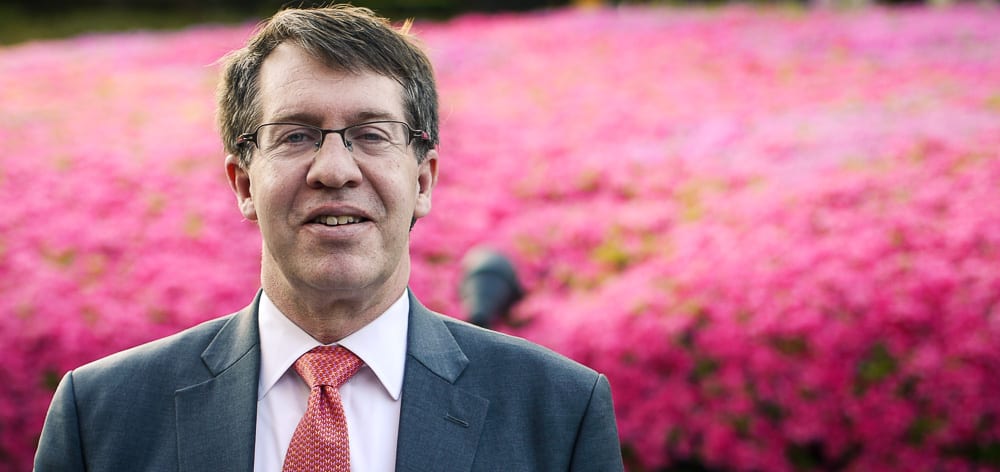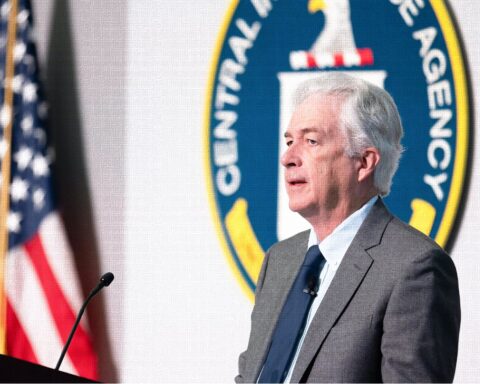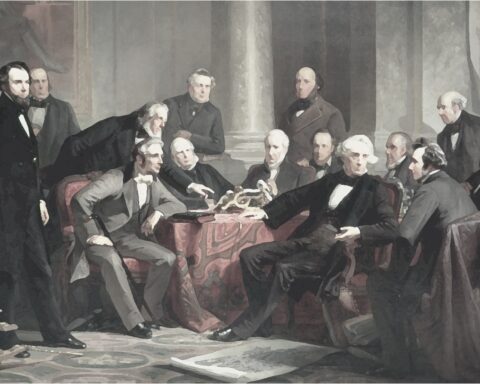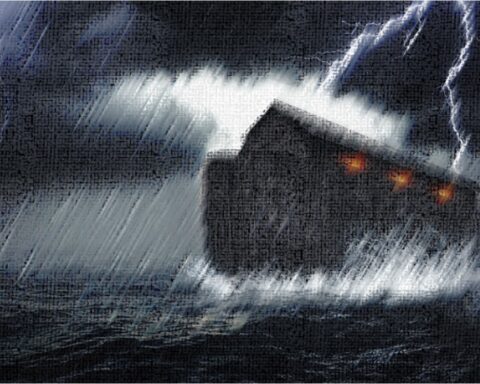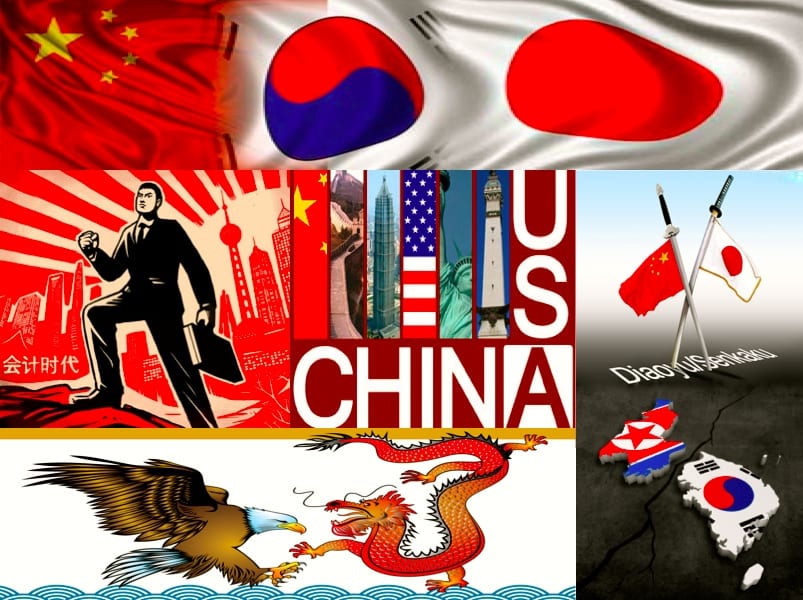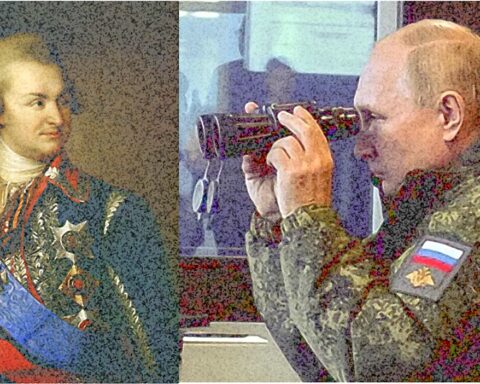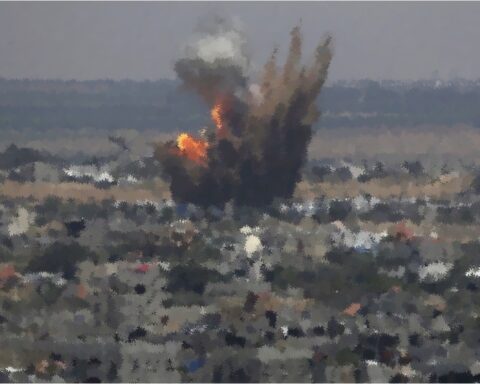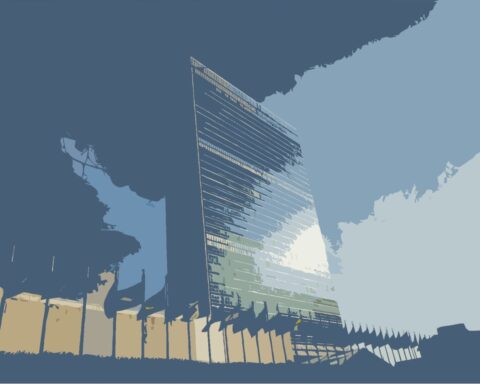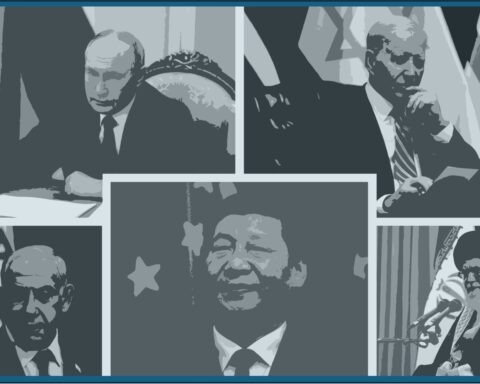While South Korea has become a major economic power, it is surrounded by far larger players in Asia. It may never be able to play a leading role in shaping both regional and international affairs, but is currently looking for ways to assert itself on the global stage. These aspirations are typical of what scholars define as a Middle Power – an international actor that is neither small nor large.
Our guest for this episode is Scott Snyder, who has written extensively on Korea, its middle power diplomacy and its efforts to find a voice in international politics. We talked about Korea’s role in the G20, its summit diplomacy of the past years and its efforts to cooperate with other middle powers.
Scott Snyder is senior fellow for Korea studies and director of the program on U.S.-Korea policy at the Council on Foreign Relations (CFR), based in Washington D.C. He has edited and co-authored several publications, the most recent of which being The Japan-South Korea Identity Clash: East Asian Security and the United States(Columbia University Press, 2015).
Prior to joining CFR, he was a senior associate in the international relations program of The Asia Foundation, where he founded and directed the Center for U.S.-Korea Policy. He was also a senior associate at Pacific Forum CSIS and a Pantech visiting fellow at Stanford University’s Shorenstein Asia-Pacific Research Center.
Scott Snyder received a BA from Rice University and earned his MA from the regional studies East Asia program at Harvard University. He was also a Thomas G. Watson fellow at Yonsei University in Seoul.
He currently writes for the CFR blog Asia Unbound.
Korea’s middle power diplomacy does represent an effort to look for ways to add value and to provide leadership and give back to the international community […] — and is appropriate for the level of distinction with which the Korean economy has performed. If you’re a top twenty economy, you should be expected to make top twenty contributions in other areas. […] I think it is admirable and appropriate that South Korea […] is looking for ways to actively make contributions to the international community.
The interview was conducted on April 27th, 2015 in Seoul by Korea and the World and is reproduced on The Policy Wire with express permission. For more exciting interviews with experts on the Korean Peninsula be sure to check out their website.
Speaker: Scott Snyder, welcome to Korea and the World.
Snyder: Thank you for inviting me.
Speaker: You are the director of the program on US-Korea policy at the Council of Foreign Relations. Why did you get interested in Korean affairs in the first place?
Snyder: I originally got interested in Korea back in the late 1980s, right before the ’88 Olympics, at the time that of Korea’s democratic transition, and I found that Korean politics is a more compelling and long-running drama then any of the others on TV and so I continue to follow it to this day.
Speaker: We are going to talk to about Korea as a potential middle power, but first could you maybe define what a middle power is?
Snyder: I think that in the international relations literature, the category has kind of developed as a way of defining those that are not great powers, but are also capable of exerting some forms of influence in international relations. You know small powers really don’t have influence, great powers have historically been the dominate actors that have attracted a lot of attention, but especially in recent years, we’ve seen the emergence of a class of countries that are not great powers, but do have a stake in the international community, and can exert forms of influence in international relations.
Speaker: What are the criteria, do they exist, can you brand any country as a middle power at some point, in terms of economics, military, or in self-powers? It seems very fluctuating.
Snyder: Yeah, I think the category is evolving initially you know the first generation of middle power literature really focused on the roles and the contributions of countries like Australia, Canada some of the Northern European countries as middle powers. Then there is a second generation of literature that focuses on I guess what you could call, “emerging middle powers”, a lot of them are dominate regional actors, South Africa, Nigeria, India have been defined although India might object. Countries that are dominate in their regions and are beginning to play roles, other roles in international relations.
Speaker: What does middle power diplomacy mean, and how does it differ from the diplomatic efforts of great powers, but also maybe of small powers. Where do you draw the line?
Snyder: I think that the first generation of literature in this area really defined middle power diplomacy as a form of diplomacy that was committed to reinforcing multilateral cooperation and reinforcing international norms or contributing to upholding of international norms. I think that South Korea by searching for models for its own diplomacy seems to have latched on to that particular definition.
Speaker: One of the forms where I think where there’s more and more talk of middle power diplomacy is the G20; is this really the one form where you see this bridge between the great powers and middle powers, and middle powers actually having some type of influence?
Snyder: To the extent that the G20 came into the spotlight as an organization that was going to take the lead in contributing to a financial policy, in the context of the 2008-2009 crisis. I think that it showed that the dominant economic powers in the G7 recognized that there were other players that could also usefully be included in that conversation and so I think that it probably did have kind of catalyzing effect, in terms of categorizing a group of countries that were suddenly able to make institutional contributions to leadership in the international community through an avenue that had not existed previously.
Speaker: So does South Korea belong to that group of countries?
Snyder: South Korea is in the G20 along with a number of other countries that have been kind of categorized in the middle power classification and in fact they’ve even banded together and formed their own grouping as you know.
Speaker: The current administration under Park Geun-hye seems to hold more for regional worldview, focusing on security initiatives, so would you say that this middle par-momentum Korea as a transit may be slowing down the last two years?
Snyder: It’s hard to say, I think the foreign ministry is embracing this concept and construct and has used it as a way benchmark roles and activities that South Korea can be involved with. But its true that the Blue House has not embraced the middle power concept, and has instead been focusing on that initiatives like in the Northeast Asia Peace and Cooperation initiative, the Eurasia initiative, or the Trust Politik initiative.
Speaker: Every year it seems Korea tries to define, or redefine its foreign policy, first it was about being in the global FTA hub, and bringing best practices, then it was all about green growth, now middle power diplomacy, now we’re moving to something else. Generally we get the feeling that South Korea doesn’t know what role it should be playing on the global scene. Is that a fair assessment, do you see middle power diplomacy as maybe the next step in this soul-searching or as a new selling point?
Snyder: I see middle power diplomacy as a useful way to benchmark characteristics that South Korea might be able to adopt or attributes that it can pursue as part of its diplomacy, as a way of making a difference in the international community; the idea of being the convener or a bridge, a catalyst in each player. I think all of these ideas are useful ways to try to define roles in a space that is crowded by larger players. It’s true that there is a shifting from administration to administration, and really an evolution of Korean foreign policy over time, and I think that the middle power idea has helped to provide some kind coherent vision over the course of the last five to eight years for suggesting what types of roles South Korea might play.
Speaker: Would you say that middle power in practice is something that countries like South Korea would brand themselves with, or do they get branded as middle powers? It’s more of a constructivist approach, but…
Snyder: So far what I see is South Korea being attracted to the concept and benchmarking it as a way of trying to define its roles and opportunities. When you really take a look at this middle power categorization, there is a bit of a problem related to the concept, because really everybody wants to be a great power, that means if you define yourself as a middle power, you’re implicitly acknowledging constraints and limits. At the same time it can be a way of channeling energy to think about how to act within those limits.
Speaker: What is South Korea as a middle power focused on right now? Is there a specific vision in South Korea, on South Korean policy making circles on what may be “middle power Korea” in the future, some very specific areas or a specific role?
Snyder: So far I think it’s more related to function, the idea of being a node in a network, or a bridge between developing in developed countries, or being a convener. I think those are the attributes that have defined Korean middle power initiatives, and I think that what remains to be seen is whether or not South Korea can identify some niche categories where it is really going to have value added, and make a difference especially in the ideas, framework, or conceptually. There is a risk that as a middle power, or using the middle power construct, that South Korea can get so busy being a convener that it doesn’t actually define where it can add value. I would argue that that is kind of a trap of the concept of middle power, or the way that it is being applied in practice that South Korea needs to try to avoid.
Speaker: Is Korea experimenting with this middle power path to move away from this image of strict trade diplomacy and somehow it wants to graduate from that and become a norm setter, or at least someone who is participating in the institutional dialog, and not just trade?
Snyder: I think that it does represent an effort to look for ways to add value and to provide leadership and give back to the international community, and it does go beyond the economic role that South Korea has. It actually goes beyond, but is also appropriate, for the level of distinction with which the Korean economy has performed. If you’re a top 20 economy you should be expected top make top 20 contributions in other areas. So in that sense I think it is admirable and appropriate that South Korea in past administrations and going forward is looking for ways to actively make contributions to the international community.
Speaker: So if we speak of the status quo Korea today, is Korea a middle power, and why? In other words, is there a significant gap between how Korea perceives itself and what it actually is when it comes to middle power diplomacy?
Snyder: I would say South Korea has benchmarked a set of middle power characteristics that one can identify has manifested in its approach to foreign policy. I think that the concept has been useful to South Korean foreign policy in terms of thinking about how to do develop attributes and contributions to the international community. It’s a harder question to answer “Does South Korea necessarily identify itself as a middle power and what that might mean?” Frankly I think that there’s a wide range of views within South Korea about it’s own diplomacy, I think a lot of them are generationally defined. If you talk to older Koreans I think they still are more comfortable defining themselves as a small player because that’s what they were taught. You might find among the younger generation, an expectation that South Korea should play an even bigger role then its currently playing, and some Korean nationalists would expect that Korea actually should be a major power.
Speaker: What would be the characteristics of Korea as middle power are we talking more about expanding on ODA? Are we talking about actually being active in UN operations?
Snyder: So I think what we saw, especially between 2000-2013, was the emergence of South Korean hosting diplomacy, through a number of initiatives. This included the G20, the hosting of the OAC development systems community, Nuclear Security Summit, major efforts in the areas of green growth. That continued I think in terms of hosting into the Park administration; we’ve seen South Korea host major conferences on cyber security, there is a Busan Internet Forum, there the World Water Forum that just occurred last week. The real question I think is where can South Korea add value by making idea contributions, and how does South Korea move from the role of convener to a niche contributor in an area where its identity in the international community actually becomes defined by or associated with a particular distinctive contribution.
I think that some progress was made especially in the context of OECD-DAC; this is the development assistance and the concept of bridging the newly emerging donors with the established donors, thinking about not aid effectiveness but development effectiveness. Essentially infusing Korea’s experience with growth into discussion about how to more effectively achieve success and development. But you know a lot of these contributions, ideas contributions, also need to be sustained, and so I think that we’re at a point two, three, four years down the road where we can look back at some of the hosting diplomacy that South Korea did in the early years, and ask “Has South Korea really organized itself to continue to contribute in these areas?” Unfortunately I would say that in a number of cases we’ve seen on the one hand, great mobilization for the event and highly successful event in the moment, but insufficient commitment to sustaining the ideas contributions over the long term, after the event that would be necessarily in order to really efficiently make a mark as a middle power, or make a middle power type contribution in these areas.
Speaker: That would be my next question, wouldn’t it be the easy way out to be the convener; its actually way more difficult to start building capabilities and the specialties so to speak.
Snyder: Yes, but hosting diplomacy is actually a good way to start, because it puts you at the center. It allowed South Korea to build on organizational capabilities and mobilization capabilities and provided some kind of experience in terms of managing multiple out or region agenda. So those are I think a good strategy for getting in, getting your nose under the tent, but in order to really sustain that contribution effectively, you need to keep your nose under the tent, but to sustain that contribution you need to keep on investing in particular areas. Really when you look closely, South Korea does not have a lot of manpower, or woman-power, relative to many countries of its size, in the diplomatic sphere. That means it is all the more important for South Korea to put a premium on choosing specific areas where it wants to add value, and sustaining contributions over time in order to provide distinction, or distinctiveness to its contributions.
Speaker: How is the Korean participation in hosting events perceived from the outside? Are these efforts appreciated?
Snyder: I do think that South Korea has been able to leave a good impression and has been able to successfully bring an unprecedented number of world leaders to South Korea over the course of the past few years, and so you know that’s a good start in terms of trying to make an impression. It’s been doing this at a time when other in countries, in particular in Europe, have been squeezed in terms of their ability to sustain public goods contributions in some areas and so in that sense that South Korea’s eagerness to try to expand its contributions in the area of development assistance, or ideas, contributions on green growth, or welcome in needed. But like I’ve said before, even if you make a good first impression you have to do more than that in order to sustain a distinctive role and contribution in the international community.
Speaker: You mentioned building capabilities, in which areas could South Korea realistically become a norm setter, and is middle power diplomacy tool to achieve that status?
Snyder: I’m not sure whether I would say norm setter, I think that maybe a norm upholder, or a ideas contributor in specific areas and I think the areas the South Korea really has shown itself to be most suited to make contributions in, are really at the nexus of development, energy and financial policy. So in some respects that’s what I think makes the fact that South Korea is now hosting the Green Climate Fund so interesting.Because really the Green Climate Fund is a new national institution, it’s about climate finance which means it’s also about potentially more efficient in contributions to development and it’s about trying to adapt to a world in which there is a need to restrain carbon emissions. So the challenge there is that South Korea is the host and it became the host because it demonstrated an interest under Lee Myung-Bak in this idea of green growth, but now it’s hosting it doesn’t necessarily have a role. It’s not on the board and it hasn’t necessarily followed up in a way that has allowed it do more than host. Again, you have this paradox of hosting, providing the way in, getting your nose under the tent, but then how do you really exploit that opportunity.
Speaker: So you think Korea should be a norm enforcer, rather then try to become a norm setter? After all it has been a great winner of the current international system, so why change it?
Snyder: Yeah, the middle power concept I think really has been abut strengthen multilateralism and strengthen internal cooperation in particular areas and so what that really is about is not setting new norms, but upholding and backing norms that have been particularly useful and providing rules of the world for the international community.
Speaker: Has Korea any chance to “punch above it’s weight” when it comes to regional politics in East Asia, Korea as the smallest power, it’s the shrimp among the whales, we’ve heard that many times. Is middle power maybe a way to have a bigger voice between Japan and China?
Snyder: I actually think the area where South Korea is most constrained is in the regional context. If you moved Korea to Europe it would be a major player, but Korea is stuck between China and Japan, and it is true that Koreans often suggest that Korea is well suited to be a catalyzer of regional cooperation, after all it is probably the only country in this sub-region that can propose an initiative without immediate suspicions about ulterior motives, but the environments in the region for South Korea I think is really characterized by a good deal of constraint. So, even though it tries for instance to show the flag on North East Asian Cooperation, and it’s in the interests of South Korea as a smaller power in the region to promote multilateralism, the fact of the matter is that we have not seen deep institutionalization in Northeast Asian.
Speaker: Can Korea truly be a middle power, considering its alliance with the United States? Is full middle power status and reliance on the US to ensure national security mutually exclusive, or is there just no connection between the two?
Snyder: I think the alliance and the middle power role have been primarily complimentary to each other, there are areas where potentially could be conflictual, but if you stop and think about the classic original middle powers, you’re talking about countries like Australia and Canada, really countries that are allies of the United States or are deeply sympathetic to, or have had opportunities that were enabled by their relationship to the United States in one form or another. You know the second generation of middle powers is more mixed, and perhaps more competitive with, or potentially less sympathetic to cooperation with the United States, so I think that you see more tension in South Africa, Argentina, Brazil, and Nigeria. They are the emerging players that have their own regional dynamic and are not as concerned with upholding the attributes of order the US is most closely associated with.
Speaker: I think you wrote in your research that the American Pivot to Asia and Korea as a middle power are actually two mutually reinforcing elements, can you expand on that?
Snyder: Really what I was trying to get that is that the alliance between the US and South Korea has been able to evolve from patron-client relationship, to more of a mutual partner relationship, primarily as a result of the fact that South Korea’s capabilities have increased, and so you know, it’s this trend of increasing capabilities that I think is really at the heart of the idea of benchmarking middle power attributes, it shows that South Korea has graduated from being the shrimp among whales, to being a player that can do something, it’s not just an object of competition among major powers. In that respect, I think that in a way you can make the argument that South Korea’s emergence as country that aspired to middle power attributes has really also enabled the alliance to become a lot more egalitarian then it used to be.
Speaker: How does China fit into this picture? Is China able to see South Korea as a middle power on its own merits so to speak? Or is it always, you know, “Put this in context in the G2, you know China versus United States” and Korea gravitating around the US?
Snyder: I do think that there are some areas where certainly China respects some aspects of the South Korean development experience. Probably it has learned from some aspects of that experience that have been useful in China’s own development. I don’t think that China has really been thinking about South Korea as a middle power; China thinks about South Korea as a peripheral country along with other countries on China’s periphery. I do think that China recognizes that South Korea is a really a critical neighbor, but I think that the attributes of South Korea’s position when China views South Korea, end up being formed more by its perception of South Korea between the US and China than about South Korea as an independent actor.
Speaker: Korea has been directing a lot of attention towards development you already mentioned that. Is that a classic middle power role actually, to be very engaged in aid? And how can Korea add value to use again that word you used?
Snyder: Non-traditional security I think is an area where we’ve seen other countries that South Korea is benchmarking makes significant contributions. Certainly the Canadians I think have taken a lot of pride in their contributions to UN peacekeeping, for instance another post-conflict stabilization, same thing with the Australians, also development contributions as well. This also includes non-traditional security, and provision of public goods, and the international development area. I think you could say that that is one area where the South Korean has been quick to associate some of their soft power efforts with their thinking about middle power roles.
Speaker: In 2013, the vice minster of foreign affairs, the Korean vice minster argued that when you think of South Korea as middle power, he said the world now works not in terms of hierarchy, but in a network fashion. Doesn’t that language of middle powers being in a network, still imply a hierarchy cause there is still a “middle”?
Snyder: You can’t live in South Korea without experiencing hierarchy as a very intuitive way of trying to order the world around you, and being a middle power does imply that there is a higher order, or higher value, or higher, stronger power that shapes the environment. That’s the reason why I’m struck by this middle power concept. Even though it has been used I think to benchmark new activities, South Korea can do in new ways of doing them, I’m also always struck by the idea that the concept also carries with it a certain connotation of constraint.
Speaker: Korea considers itself part of a middle power group called the MIKTA, short for Mexico Indonesia Korea Turkey and Australia, which was initially created to coordinate their action with the G20. What is the objective of this group, and what have they achieved?
Snyder: MIKTA has really been around now for a year and a half, they’ve issued a few statements, one of North Korea, one on Ebola, and I think there’s a third one. It’s a very unusual grouping because most of the groupings of this type end up being regionally based, but as you mentioned it really does I think stem from the involvement of the five countries in the G20. They don’t act as a caucus within the G20, but they are bound together as the putative democracies within the G20 context that are not part of the G-7. So in many respects you could make an argument that they are the countries that care the most about, and have the most to gain from an effective G20 process and then they’ve also I think attempted to define themselves as countries that, generally speaking, as democracies and emerging middle powers can make distinctive values based or like-minded contributions. I think that we really haven’t seen yet is a coherent definition, we’ve seen a couple of examples, but we don’t necessarily have a coherent definition of what the scope of that activities will be or how it might develop going forward and in the future.
Speaker: So as of now there is no institutionalization of MIKTA, there’s no organization, no headquarters. Is it just a loose group? Or do you see some institutionalization going on?
Snyder: There’s just an annual rotating chairmanship that passes among the five really the foreign minsters, and I think an effort by the chair to keep up a website, so far this is a grouping that has functioned primarily at the foreign minster level, so one interesting question is whether or not it can develop into a head of state meeting. If it did, what kind of issue would bind the heads of state together? In a way I think that it’s an interesting grouping because of this G20 framework, but it also is still in formation.
Speaker: Do you see any primary drivers for MIKTA long term? Isn’t there an issue being a middle power but the same time having a like-minded ruling in the G20, maybe these two things could be incompatible?
Snyder: I think that the middle power characterization is actually what ends up binding these particular countries together in that G20 context, and of course you know that term both sets and chafes for the various countries in particular grouping. So I do not anticipate that MIKTA will end up being defined as a middle power grouping, or as a grouping of middle powers because I think there are some countries, such as Indonesia, I don’t think really wants to think of itself as a middle power, and yet it is a very fitting partner within the G20 context with the other members of this particular group.
Speaker: So you see MIKTA playing a bridging role between the major powers, within the context of G20?
Snyder: I don’t know if it it’s going to be bridging, I actually see MIKTA as coordination among MIKTA members as the potentially the best driver for efforts to ensure that the G20 remains relevant and distinctive in its efforts to make contributions on the international, financial policy scene.
Speaker: Do you think that in this institution to use that word, like MIKTA, could be effective because of high moral credibility? In the sense that the US or China will be suspect of trying to you know establish dominate position, and the BRIC grouping is already heavily politicized, is there maybe a niche that MIKTA or equivalent could play as an arbiter of someone who doesn’t have second policy or have a secret agenda?
Snyder: Theoretically, but I think that we don’t yet see the organization cohering around an effective ideas contribution, and so that means that it’s a grouping there that is like minded, but they don’t necessarily have the resources to make a difference and they haven’t cohered around a specific idea. So I would say really what MIKTA needs is a compelling and actionable idea that is going to motivate the members to drive it, and we just don’t have that yet. I think that for all of these similarities among these countries it’s just as easy to find ways in which they are different or really the challenge is to have all of them agree with the same level of enthusiasm to work together on a particular project; and that has to be defined as well.
Speaker: So you don’t think such diplomacy can continue in the long run in it’s current form, because they just don’t have enough in common?
Snyder: I’d say that the organization is probably going to continue as a something that is more similar to a contact group. An opportunity a useful opportunity for these countries to touch base, but until the five come together around a particular cause it’s hard to imagine that the grouping can develop into anything more than a contact group.
Speaker: What is your personal assessment of MIKTA? Would you agree with some observers that Korea should focus on being a leading voice in the G20 itself, because it’s really the only forum where it can have maximum influence?
Snyder: I think there’s a logic to having bandwagon together to other like-minded countries to really think about it and act to give the G20 coherence and meaning, in many respects, the opportunity to make this sort of contribution to the international community is a fleeting one, and the G7 is still essentially a competitor to the G20, and in some respects you could make the argument that since the height of the financial crisis 2008-2010, the G20 has kind of sulked back into a secondary position to the G7. So if these countries that got their seat the table, at the larger table, want to make a difference and that opportunity effectively than actually the common interest is that they should watch to see the G20 making distinctive contributions and driving some of the agenda items that were identified a the height of the crisis, but now have kind of lost momentum because as things have shifted back to normal, the sense of crisis has worn off and so the sense of urgency has passed.
Speaker: Maybe a quick word about middle power diplomacy and North Korea, South Korean politicians and analysts have repeatedly been referring to middle power diplomacy as a way to engage North Korea, or ease the North Korea issue and to push the whole reunification question forward. Does this amount to anything; is this actually a viable option? It seems to me that North Korea’s a domestic issue, and you know middle power diplomacy will not really help there.
Snyder: In a way, I think the term for it is a “distraction”. Really when you look at the inter-Korean relationship I think it’s still hard to escape from the longstanding frame of division on the Korean Peninsula: a manifestation of the competition for legitimacy. So where the idea of middle power might be channeled to or might be attractive to some South Koreans, it is really as a way of trying to consolidate an advantage that comes from the fact that South Korea has a standing in the international community while North Korea is marginalized. So this is really part of an effort that I think that we’ve seen much more clearly over the course of the past five years really since the sinking of the Cheonan, to use international consensus and international forums as a way of trying to reinforce South Korea’s position as the winner of the legitimacy competition and also to reinforce to the North Koreans they’ve lost or that they have been boxed in one way or another.
Speaker: To conclude on this middle power conversation, how much does it actually matter? Do the United States and other great powers pay attention to this kind of, this track of diplomacy? Do they pay attention to these countries more than others or is this merely an issue in the realm of analysis, academia?
Snyder: I don’t think most American diplomats, or even scholars of international relations are really that concerned with the idea of middle power diplomacy, or are very focused on it as an organizing concept of international relations. I think it’s still the case in the United States, realist thought is going to focus on power is the instrument by which to achieve objectives, liberalists are going to focus more on cooperation perhaps, and cooperative structures, and I think the middle power concept is really one that is more consequential as part of South Korean debate. American observers, especially observers of Korea, may watch that debate. The other thing you could say about the middle power is in a way, the concept does represent a kind of repudiation of some of the literature of recent years, predicting that the next stage of global governance is going to be the G0, because you’re a middle power concept still implies and upholds the idea of an order. Whereas I think the G0 concept is one that suggests that power is so diffused that it has become unmanageable. In the other area where I think this concept intersects with American themes, is related to Korea’s rise of the rest, so you’re basically talking about power diffusion, and middle power is definitely a part of power diffusion discussion.
Speaker: Do you welcome these new categories, such middle power and MIKTA, or does this only add to what some criticize as the patchwork if the occasion of international relations with even more groups, forums, and institutions, and maybe ultimately talk shows?
Snyder: I think the middle power concept has been useful as an organizing principle for enabling South Korean thinkers to consider how to improve some of their foreign policy efforts. Ultimately, this is a category of analysis; it’s not necessarily consequential as a part of international diplomacy per se. It’s just the question of whether it’s useful to those who are focused on it as a way of improving foreign policy implementation, or if it helps people to understand the world around them.
Speaker: Scott Snyder, I thank you very much for being our guest, and for your time.
Snyder: Okay, thank you.
